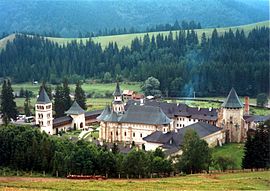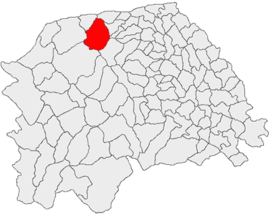Putna (German: Kloster-Putna)[2] is a commune in Suceava County, in the historical region of Bukovina, northeastern Romania. It is composed of two villages, namely Gura Putnei (German: Karlsberg) and Putna. The Putna Monastery, Putna River, and the cave of Daniil Sihastrul are located in this commune. It is also the starting point of the Via Transilvanica long-distance trail.[3]
Putna | |
|---|---|
 The medieval Putna monastery (as seen in the summer of 2000) | |
 Location in Suceava County | |
| Coordinates: 47°52′N 25°37′E / 47.867°N 25.617°E | |
| Country | Romania |
| County | Suceava |
Area | 133.70 km2 (51.62 sq mi) |
| Population (2021-12-01)[1] | 3,658 |
| • Density | 27/km2 (71/sq mi) |
| Time zone | EET/EEST (UTC+2/+3) |
| Vehicle reg. | SV |
History
editMoldavia (1388–1775)
Habsburg Monarchy (1775–1804)
Austrian Empire (1804–1867)
Austria-Hungary, Cisleithania (1867–1918)
Kingdom of Romania (1918–1947)
Romanian People's Republic (1947–1965)
Socialist Republic of Romania (1965–1989)
Romania (1989–present)
As it is the case of other rural settlements from Suceava County, Putna was previously inhabited by a sizeable German community, more specifically by Zipser Germans (part of the larger Bukovina German community) during the modern period up until the mid 20th century, starting as early as the Habsburg period and, later on, the Austro-Hungarian period. The German community was primarily significant in Gura Putnei (German: Karlsberg).
Administration and local politics
editCommunal council
editThe commune's current local council has the following political composition, according to the results of the 2020 Romanian local elections:[4]
| Party | Seats | Current Council | |||||||||
|---|---|---|---|---|---|---|---|---|---|---|---|
| National Liberal Party (PNL) | 9 | ||||||||||
| Social Democratic Party (PSD) | 3 | ||||||||||
| Independent (Crețan Ciprian-Florentin) | 1 | ||||||||||
Gallery
edit-
Overview of Putna
-
View of Putna village
-
Putna monastery
-
Aerial view of Putna monastery
-
Roman Catholic church in Gura Putnei
-
Putna train station (summer 2000)
-
Putna train station (2016)
-
Mănăstirea Sihăstria Putnei wooden church
-
Mănăstirea Sihăstria Putnei old church
-
Daniil Sihastrul's hermit house
-
Culture House in Putna (2011)
-
Putna town hall and the local council of the commune
References
edit- ^ "Populaţia rezidentă după grupa de vârstă, pe județe și municipii, orașe, comune, la 1 decembrie 2021" (XLS). National Institute of Statistics.
- ^ "Southern Bukovina German villages – 1940" (PDF). Retrieved 17 September 2022.
- ^ "Trail | Via Transilvanica". www.viatransilvanica.com. Retrieved 2023-08-10.
- ^ "Rezultatele finale ale alegerilor locale din 2020" (Json) (in Romanian). Autoritatea Electorală Permanentă. Retrieved 2020-11-02.

